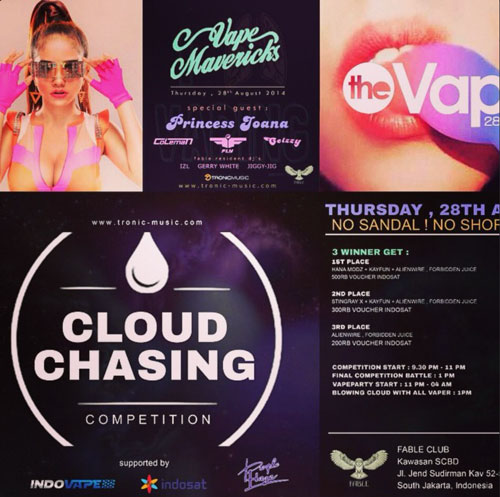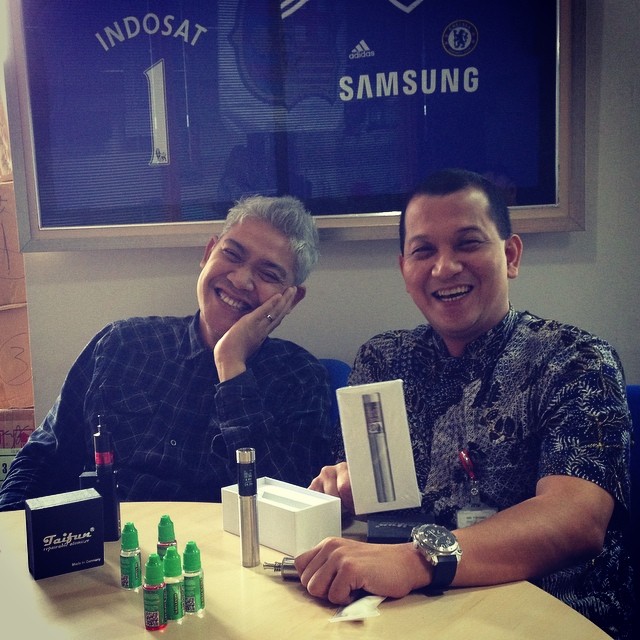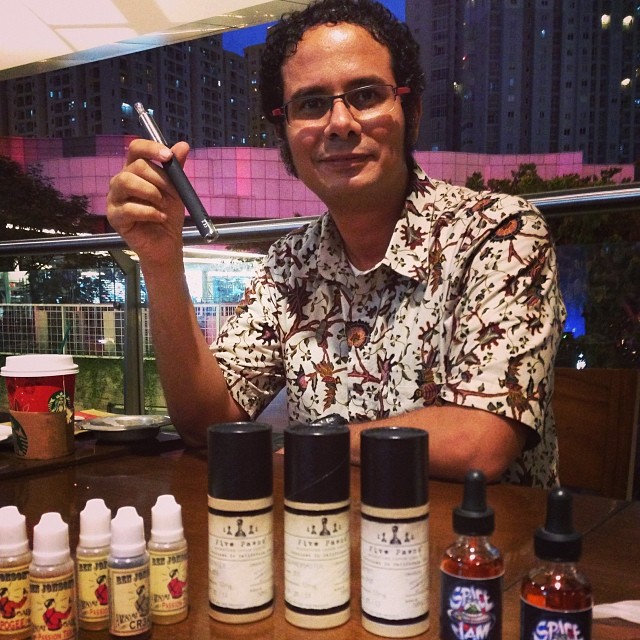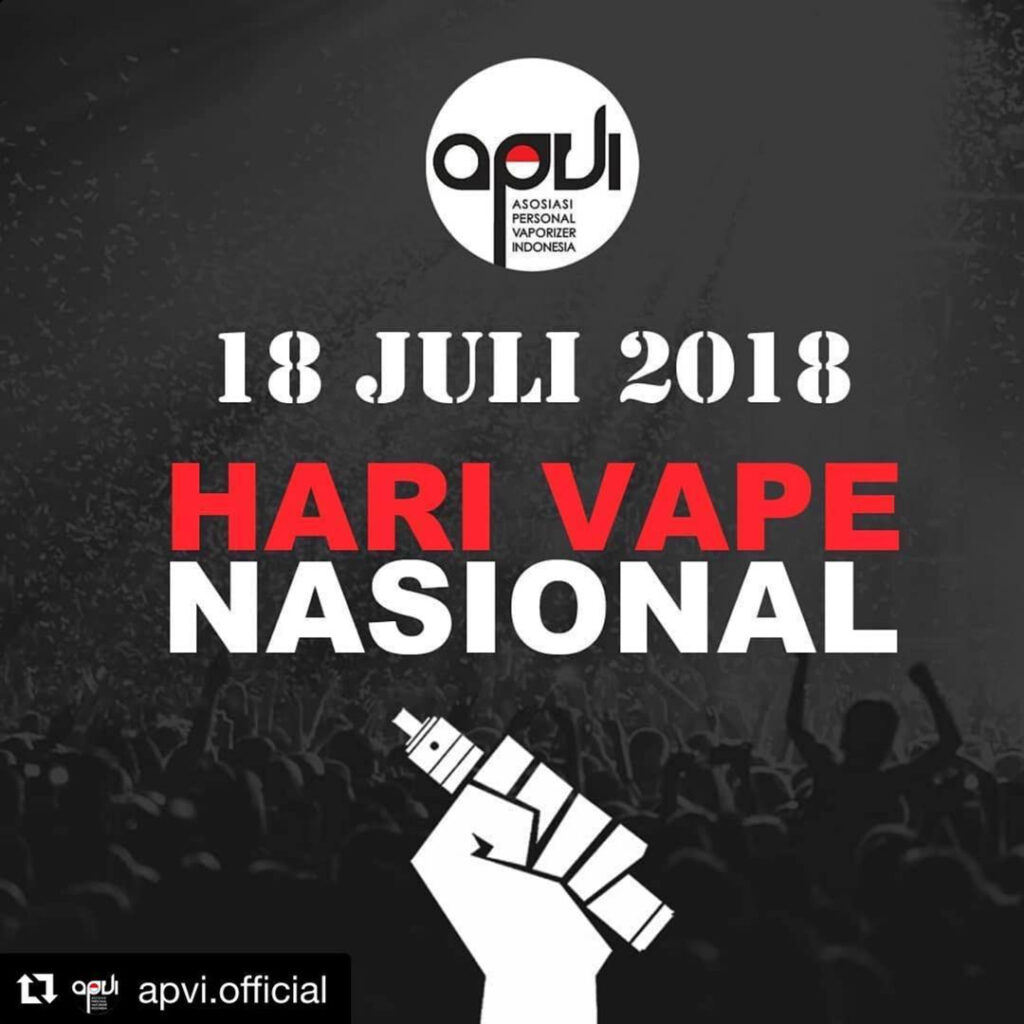Indonesians vape to quit smoking

MARCEL THEE, Contributing writer.
March 31, 2015 13:00 JST
JAKARTA — Few countries in the world can compare with Indonesia in the production of tobacco or the consumption of cigarettes. It is therefore surprising to see a boom in the sale of tobacco-free vaporizers — a type of e-cigarette — as a way to quit smoking.
E-cigarettes have been on the market since 2003. Mechanical personal vaporizers, however, were only introduced a few years ago. Sales are still unregulated, and new specialized shops are popping up online and in low-end malls.
Vaporizers often eschew the way e-cigarettes ape the form and taste traditional cigarettes. Users have the alternative of inhaling flavored e-liquids from these devices, which resemble pipes or pens, often have a metallic sheen and contain customizable parts. Members of the vaping community trade tips on how to modify the devices.
Vaporizers have become popular with smokers and nonsmokers because the devices can be personalized and there are a wide variety of flavors available. The menu of “e-liquids” available in Indonesia is extensive: fruits, tiramisu, cappuccino, pickle, pizza, popcorn, custard, gingerbread and bacon are quite common. Less popular are the tobacco, Cuban cigar or kretek clove cigarette flavors. You can get e-liquids that are laced with nicotine — which gives a similar hit to smoking cigarettes — but these are regulated and harder to buy.
 Vaping communities regularly gather at “vape-meets”, and exchange tips for modifying their devices. Finding space to do so isn’t hard in Indonesia, because the lack of regulation means vaporizers can be used practically anywhere. Unlike in many countries, they are allowed in enclosed or air-conditioned public spaces, as long as the liquid does not contain nicotine.
Vaping communities regularly gather at “vape-meets”, and exchange tips for modifying their devices. Finding space to do so isn’t hard in Indonesia, because the lack of regulation means vaporizers can be used practically anywhere. Unlike in many countries, they are allowed in enclosed or air-conditioned public spaces, as long as the liquid does not contain nicotine.
For the sellers, the lack of regulation is a good thing. Obtaining their goods almost exclusively from China at wholesale prices and without any kind of screening process, online merchants who do not need to pay store rent enjoy a 30-40% profit margin. Anton Zhou, who runs the online shop vapbulous.com, said he can make a profit of 100 million rupiah ($7,638) in a good month.
“The best thing about vaporizers is that everything in them is practically sellable,” said Zhou. Indeed, on his website, Zhou sells everything from the tank which holds the liquid, batteries and chargers, extension tubes, coils used to burn the liquid, wires and numerous vaporizer models. These different models sell between 50,000 rupiah up to 3 million rupiah, depending on quality.
Alexandro Endy Wibowo, who runs a new online shop called Vapejo.com, sold around 3,000 vaporizers in the last quarter of 2014.
 All in the action
All in the action
Many customers are like Dion Panlima Reza, a 30-year-old who has smoked since he was 15 but has quit since picking up his first vaporizer six months ago. “I’ve not smoked (cigarettes) since.” He vapes only non-nicotine e-liquids. Dion said that vaping resembles the action of smoking. He said the physical habit of smoking was much harder to crack than the nicotine cravings.
Ex-smokers also say that they appreciate that vaping has a more preferable aftereffect than cigarettes.
“After a week of vaping, the taste of cigarette felt distasteful. Breathing became lighter, no case of bad breath, I didn’t tire or feel ill as easily, and I grew a better appetite,” said Fajar Abri Putranto, 30.
In a country where a packet of Marlboro cigarettes only costs a little over a dollar, the government has done relatively little to convince the more than 70 million adult regular smokers — a figure provided by Indonesia’s Tobacco Control Support Center — to quit. In fact, the proportion of adult males who smoke has gone up from 53.4% in 1995 to 65.9% in 2010, while the rise among women was even more drastic: from 17% to 42% over the same period. In a report, the center wrote that the government earned $7 billion from tobacco-related excise in 2011, and allocated $3 billion to the Ministry of Health.
The smoking culture has made tobacco-business owners very wealthy. Brothers Budi and Michael Hartono, who head Djarum kretek, topped the Forbes rich list in the country in 2014. In second place was Susilo Wonowidjojo, who owns Gudang Garam.
While there is no reliable data on the number of vaporizer users in Indonesia, it is believed to be insignificant compared with tobacco sales. A representative of one of Indonesia’s largest tobacco companies, who requested anonymity, said there is no comparison and that his company is merely “observing” the rising fashion of “vaping.”
But Elvira Lianita, head of regulatory affairs, international trade and communications at Sampoerna, one of Indonesia’s largest tobacco companies, said the company supported regulating e-cigarettes and vaporizers.

Feeling better
Surprisingly, most vaporizer sellers agree they should be regulated.
Quintonio Kalalo, who runs Indovape.com, said there is concern that less experienced sellers are mixing e-liquids to create new flavors without exercising any caution. There has so far been no report of death or illness caused by these mixes in Indonesia, but sellers say that the quality of e-liquids varies and that it is a bad idea to mix certain chemicals together. Improper modification of vaporizers can also harm the users.
While he worries that regulating the industry would devastate the thriving business momentum, Kalalo said it could lead to a homegrown industry producing vaporizers and e-liquids.
Wibowo also thinks that regulation could have benefits. “There are good aspects to it being in a grey area, but it also means a lot of misinformation produced by the media or the government,” he said.
Kalalo said he hoped the government would see vaporizers as a good way to cut down the high smoking rate in Indonesia, as he discovered himself. He said he found it difficult to quit even when he was a student in Australia and spending up to $25 on a pack in a country that has one of the highest cigarette taxes in the world. He recalled “loving the feel of the smoke going into my lungs, but also knowing my lungs was not able to take anymore” before he tried a vaporizer. After 15 years as a smoker, he quit in a day.

Source: https://asia.nikkei.com/Business/Indonesians-vape-to-quit-smoking

